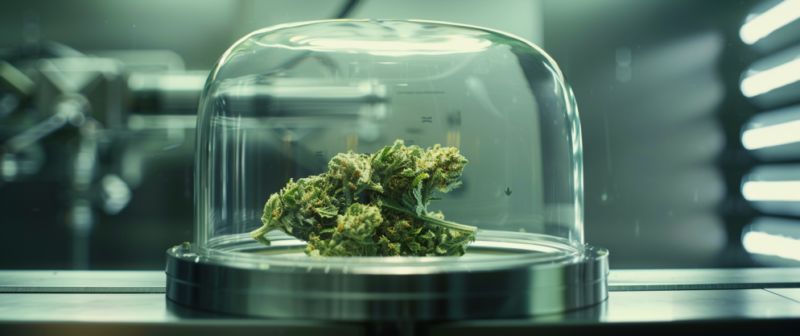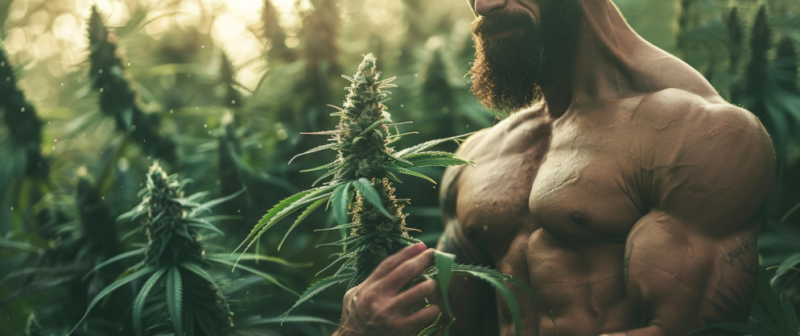Is Delta-8 Allowed in the Military
Curious about is delta-8 allowed in the military? What exactly is Delta 8, and what laws regulate its use?
We will discuss Delta 8’s legal status, federally and in different states. Find the potential risks associated with Delta 8, how it is consumed, and alternative options available. Find out more about Delta 8 and its permissibility in the military.
What Is Delta 8?
Delta 8 is a chemical compound and a type of cannabinoid found in cannabis plants, known for its psychoactive effects that are somewhat similar to those of Delta 9 THC but typically less potent.
Delta 8, also called D8, is structurally similar to Delta 9 THC with a double bond in the 8th carbon chain, hence the name. It’s derived from hemp or cannabis through a process of isomerization, where CBD is converted into Delta 8. This compound interacts with the endocannabinoid system in the body, affecting the CB1 receptors but with a lower affinity compared to Delta 9 THC.
One key difference between Delta 8 and Delta 9 THC lies in their psychoactive potency. Delta 8 is commonly reported to offer a milder high without the intense psychoactive effects often associated with Delta 9 THC. Users describe a smoother experience with decreased stress and paranoia, making Delta 8 a popular choice for those seeking relaxation without overwhelming effects.
Is Delta-8 Allowed In The Military?
Delta 8, a cannabinoid derived from cannabis plants, is a subject of significant concern and scrutiny within military circles, particularly about the Army Substance Abuse Program and the Uniform Code of Military Justice, which govern the conduct and regulations for active duty service members.
The utilization of Delta 8 among active duty military personnel raises numerous complex issues concerning compliance with military regulations. Those serving in the military are subject to stringent policies outlined in the Uniform Code of Military Justice, which strictly prohibit the use of controlled substances, including substances like Delta 8. Violations of these regulations can result in severe consequences, ranging from disciplinary actions to discharge from service.
The Army Substance Abuse Program plays a crucial role in the prevention, education, and therapy of substance abuse issues, aiming to maintain the health and readiness of military members. Delta 8 falls under the category of substances that are closely monitored within the program, and any indication of misuse or abuse can trigger interventions and rehabilitation efforts.
General Legality of Delta-8 THC
Delta-8 THC (Delta-8-tetrahydrocannabinol) is a cannabinoid found in the cannabis plant. It’s chemically similar to Delta-9 THC, the compound most commonly associated with the psychoactive effects of marijuana, but it is typically considered to be less potent.
Federal Laws
Under federal law in the United States, Delta-8 THC falls into a gray area due to the 2018 Farm Bill. This legislation legalized hemp and hemp-derived compounds, as long as they contain no more than 0.3% Delta-9 THC. Since Delta-8 can be derived from hemp CBD, many interpret the law to mean that Delta-8 THC is legal if it comes from hemp.
However, the Drug Enforcement Administration (DEA) issued an Interim Final Rule in August 2020, which some interpret as suggesting that synthetic cannabinoids, including synthetically derived Delta-8 THC, are illegal. The ambiguity arises because most commercially available Delta-8 THC is synthesized from CBD through a chemical process, potentially making it a controlled substance under federal law.
State Laws
State laws regarding Delta-8 THC vary widely. Some states have explicitly banned it, others have laws that are silent on the matter, and others allow it. Here are some general trends:
- Banned States: Some states, such as Alaska, Arizona, Arkansas, Colorado, Delaware, Idaho, Iowa, Mississippi, Montana, Rhode Island, and Utah, have explicitly banned Delta-8 THC.
- Regulated States: Other states have taken steps to regulate Delta-8 THC similarly to Delta-9 THC. For example, Oregon and Colorado have implemented regulations on its production and sale.
- Permissive States: Many states, particularly those with legalized medical or recreational cannabis, do not specifically ban Delta-8 THC and allow its sale under certain conditions.
Legal Gray Areas
The legal status of Delta-8 THC is particularly complicated due to:
- Federal Ambiguity: The 2018 Farm Bill and the DEA’s interpretation have created confusion about whether Delta-8 THC derived from hemp is legal or not.
- State Legislation: Each state has different laws and interpretations, so what is legal in one state can be illegal in another, leading to a patchwork of regulations.
- Enforcement: Even in states where Delta-8 THC is legal, enforcement can vary widely, and new legislation or court rulings can quickly change its status.
Recent Legislative Updates
Recent legislative trends indicate that more states are beginning to address the legality of Delta-8 THC explicitly. For example:
- 2021: Several states moved to ban Delta-8 THC, including New York, which classified it as a controlled substance. Other states like Texas saw legislative attempts to ban it fail, leaving it in a legal gray area.
- 2022: States like Kentucky proposed legislation to regulate rather than ban Delta-8 THC, reflecting a shift towards regulation over outright prohibition.
- 2023 and Beyond: With increasing attention to cannabinoids and the growth of the hemp industry, more states are likely to revisit their laws on Delta-8 THC. Federal legislative updates could also provide more precise guidance.
Overview of Military Substance Use Policies
The U.S. military maintains strict policies regarding substance use, reflecting its commitment to maintaining a high level of discipline, readiness, and overall health among service members. These policies ensure that all personnel are fit for duty and can perform their responsibilities without impairment.
Zero-Tolerance Policy for Controlled Substances
The military enforces a zero-tolerance policy for the use of controlled substances. This includes:
- Illegal Drugs: The use, possession, or distribution of illicit drugs (e.g., marijuana, cocaine, heroin, methamphetamine) is strictly prohibited.
- Misuse of Prescription Drugs: Service members are prohibited from misusing prescription medications. This includes using someone else’s prescription or using their prescription in a manner inconsistent with medical instructions.
- Synthetic Drugs: The use of synthetic drugs, such as synthetic cannabinoids (e.g., Spice, K2) and synthetic cathinones (e.g., bath salts), is banned.
- Performance-Enhancing Drugs: Unauthorized use of anabolic steroids and other performance-enhancing drugs is also prohibited.
The consequences for violating the zero-tolerance policy are severe and can include administrative actions such as reprimands, non-judicial punishment, administrative separation from the service, or court-martial.
Drug Testing Protocols in the Military
The military employs rigorous drug testing protocols to enforce its substance use policies. These protocols include:
- Random Testing: All service members are subject to random, unannounced drug testing, which is conducted regularly to deter and detect substance use.
- Unit Sweeps: Entire units can be tested at once in unit sweeps, often without prior notice, to ensure a drug-free environment.
- Command-Directed Testing: Commanding officers can order drug tests for individuals or groups if there is a suspicion of drug use.
- Accident/Incident Testing: Service members involved in accidents or incidents, particularly those resulting in injury or damage, may be tested for drug use.
- Pre-Deployment and Post-Deployment Testing: Drug testing is often conducted before and after deployments to ensure service members are not using controlled substances.
- Entry and Exit Testing: Recruits undergo drug testing as part of the enlistment process, and service members may be tested upon separation from the military.
Testing Procedures
- Urinalysis: Urinalysis is the primary method for drug testing in the military. Samples are collected under strict chain-of-custody procedures to prevent tampering.
- Laboratory Analysis: Samples are sent to certified laboratories for analysis. These labs use advanced techniques to detect a wide range of substances, including common drugs of abuse and newer synthetic drugs.
- Confirmation Testing: If an initial test result is positive, a confirmatory test uses more precise methods to rule out false positives and ensure accuracy.
Legal and Administrative Actions
- Administrative Actions: Positive test results can lead to administrative actions such as letters of reprimand, reduction in rank, loss of pay, and denial of reenlistment.
- Non-Judicial Punishment (NJP): Under the Uniform Code of Military Justice (UCMJ), commanding officers can impose NJP for drug-related offenses, including extra duties, confinement to barracks, and other disciplinary measures.
- Court-Martial: Severe cases, especially those involving distribution or repeated offenses, can result in a court-martial, which may lead to imprisonment, dishonorable discharge, and other severe penalties.
Support and Rehabilitation
While the military enforces strict substance use policies, it also provides support for service members struggling with substance abuse:
- Substance Abuse Programs: Each military branch offers programs designed to provide education, prevention, and therapy services.
- Confidential Counseling: Service members can access confidential counseling and support services to address substance use issues without immediate fear of disciplinary action, although certain conditions and limitations apply.
What Are The Laws And Regulations Surrounding Delta-8?
Delta 8’s legal status is complex, influenced by various federal and state laws and regulations, including the Agriculture Improvement Act of 2018, policies from the Food and Drug Administration, and the Controlled Substances Act, all overseen by the Drug Enforcement Administration.
Is Delta 8 Legal Federally?
Federally, the legality of Delta 8 is somewhat ambiguous. It is shaped by the Agriculture Improvement Act of 2018, which legalized hemp and its derivatives, the Food and Drug Administration’s stance, and interpretations of the Controlled Substances Act.
While the Agriculture Improvement Act of 2018 removed hemp from the federal list of controlled substances, leading to the legal production of hemp-derived products, including Delta 8, the FDA’s policies create additional layers of complexity.
Considering the Controlled Substances Act’s classification of Delta 8 as a psychoactive substance, courts, and regulators have grappled with reconciling the conflicting guidelines. Some states have explicitly banned Delta 8, citing federal uncertainty, while others permit its sale under certain conditions.
Is Delta 8 Legal In All States?
The legality of Delta 8 varies significantly across states, with some states enacting specific regulations and policies that either explicitly allow or ban the substance.
For instance, states like Texas have taken a clear stance by legalizing Delta 8 THC, making it accessible for residents to purchase and use without fear of legal repercussions. On the other hand, states such as New York have imposed stricter regulations, requiring licenses for sale and consumption. This diversity in state policies not only influences the availability of Delta 8 products but also impacts consumer awareness and the overall market landscape. Individuals residing in states with more lenient regulations may find exploring Delta 8’s potential benefits easier. In contrast, those in heavily regulated states face hurdles in acquiring and using these products.
What Are The Potential Risks Of Delta 8?
The potential risks associated with Delta 8 consumption include the likelihood of triggering positive drug tests and experiencing various side effects, which can arise from the ingestion of this cannabinoid and other related substances.
Are There Any Known Side Effects Of Delta 8?
Known side effects of Delta 8 include drowsiness, dry mouth, and altered sensory perception, which can vary based on the substance’s amount and method of ingestion.
These side effects are generally mild to moderate, with drowsiness being the most common and least severe. Dry mouth, or cottonmouth, is relatively frequent but easily alleviated with hydration. Altered sensory perception, such as changes in vision or hearing, tends to occur less often but can be more disconcerting.
Delta 8 is typically consumed through vaping, edibles, or tinctures, with each method affecting the onset and duration of side effects. Vaping, for instance, provides a quicker onset but may lead to more pronounced sensory alterations. Edibles, on the other hand, can prolong the effects but might cause more substantial drowsiness. When compared to Delta 9 THC, Delta 8 generally produces fewer psychoactive effects and milder side effects overall.
How Is Delta 8 Consumed?
Delta 8 can be consumed in various forms, including oils, edibles, and vape products, with each method of ingestion offering a unique experience and requiring careful consideration of dosage.
What Are The Different Forms Of Delta 8?
Delta 8 is available in several forms, including oils, edibles like gummies, and vape products, each providing different user experiences and benefits.
Delta 8 oils are one of the most common forms and are typically consumed sublingually for quick absorption into the bloodstream. They offer precise dosing and are popular for their convenience. On the other hand, edibles such as gummies come in various flavors and are discreet, making them a favorite among those who prefer a tasty alternative. The effects may take longer to kick in compared to oils or vapes.
Alternatively, vape products provide rapid onset effects, making them ideal for users seeking instant relief. These products come in cartridges or disposable pens, offering portability and convenience. Some users may find vaping less discreet compared to other forms, and it may not be suitable for those with respiratory issues.
What Is The Recommended Dosage Of Delta 8?
The recommended dosage of Delta 8 varies depending on the form of ingestion, with oils and edibles typically requiring careful measurement to avoid adverse effects.
When determining the appropriate dosage, factors such as individual body weight, metabolism, and experience with cannabinoids must be considered. It is recommended to start with a low dosage and gradually increase until the desired effects are achieved. Consulting with a healthcare professional or knowledgeable budtender can provide valuable insight into the optimal dosage for your needs. Keep in mind that impact can vary based on personal tolerance levels, so it’s essential to be mindful of your body’s response to Delta 8.
Final Thoughts – Is Delta-8 Allowed In The Military
The permissibility of Delta 8 within the military remains heavily regulated and generally prohibited, with strict enforcement under the Army Substance Abuse Program and the potential for positive drug tests leading to significant consequences for military personnel.
Understanding military regulations surrounding Delta 8 is crucial for service members to avoid unintentional violations that could jeopardize their careers and missions. The risks involved extend beyond personal consequences, including compromised operational readiness and security concerns. Military personnel must be well-informed about the legal implications of consuming substances like Delta 8, as ignorance of regulations is not a viable defense in military justice systems.
Frequently Asked Questions
Are there any restrictions on the use of delta 8 in the military?
While delta 8 is currently allowed in the military, there may be restrictions on its use in certain situations. For example, consuming delta 8 while on duty or during a deployment may still be prohibited. It is important to always follow unit policies and laws regarding substance use.
What are the potential consequences of using delta 8 in the military?
Using any substance, including delta 8, without proper authorization or in violation of unit policies can result in disciplinary action. This can range from warnings and counseling to more serious consequences depending on the severity of the violation.
Is delta 8 legal for civilians?
Yes, delta 8 is currently legal for civilians at the federal level as long as it is derived from hemp and contains less than 0.3% delta 9 THC. However, some states may have their own regulations regarding its legality, so it is important to check local laws before purchasing or using delta 8 products.


